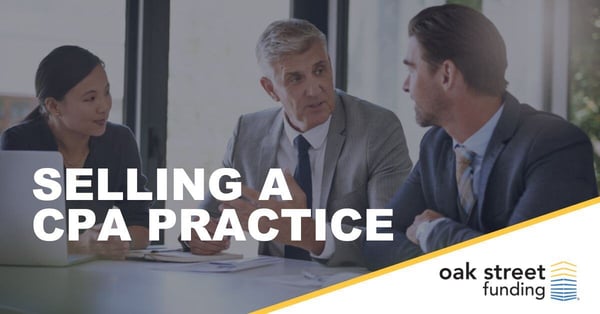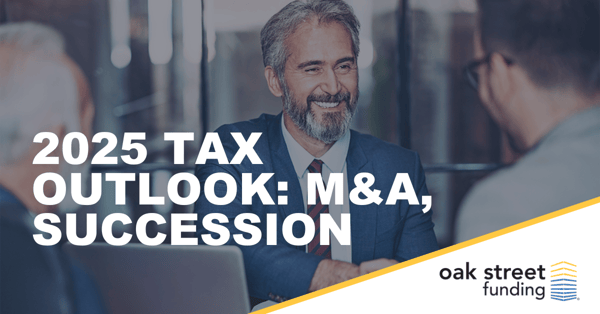
At some point, nearly all CPAs consider selling their business. Reasons range from retirement to scaling back on day-to-day work to passing on the practice to the next generation.
For businesses without a designated next-generation owner, finding a buyer can seem like the most daunting part of the process. Fortunately, there are tools that can help. Marketplaces such as Oak Street Funding’s complimentary specialized Practice Exchange can get your practice right in front of potential buyers.
Many potential buyers and sellers sign up for our Listing Alerts to receive notifications when an opportunity that meets their criteria is posted on the exchange. It's easy and free to set up a profile for your practice. You can also search for other practices in your area that are for sale.
Before jumping into the exchange, consider the following topics to support selling your business successfully.
Preparing to sell your CPA Practice
Before listing your practice, be ready for the sale. And this can mean different things to each person.
Consider how you want to exit the business and reins. Do you want a sale in which you have a continuing management role? Do you want to walk away entirely? Those decisions are highly personal and require careful thought and consideration, and they will have an impact on the kind of sale you want to make.
Have the practice operating in such a way that it will bring in maximum value. Take time to streamline operations and clean up any problems before listing the business to make the offering appealing – and potentially more valuable – to possible buyers.
Have all your paperwork in order. You’ll need to have clean financials for the previous three years, along with evidence of appropriate compliance with all applicable industry regulations.
Assessing the value of your practice
Determining what your business is worth involves many factors. For a CPA practice where assets are represented primarily by cash flow rather than fixed assets, a good place to start is with EBITDA (earnings before interest, taxes, depreciation, and amortization).
That figure will need to be adjusted to back out any expenses that are unlikely to continue after the sale and to add back in any revenues that are likely to increase, creating a pro forma EBIDTA. An appropriate multiple for the industry and the size of your practice is applied to the pro forma EBITDA to come up with a rough initial valuation.
Other considerations that affect value include whether or not the business is growing, whether current management and/or key staff will stay in place after the sale, the overall strength of the economy and industry, and the diversity of the client base. It can be wise to consult a valuation professional to help determine the worth of your practice before making a decision to sell.
Performing Due Diligence
Once a buyer and seller come together, both parties move into the due diligence phase. This step is crucial to the success of a sale, and it protects the interests of all involved.
-
- For the buyer, this means gaining access to confidential information about the company’s financials, clients, and vendors.
- For the seller, doing due diligence can mean verifying the buyer’s ability to make the purchase and successfully operate the business in the future, thus protecting the seller’s reputation and legacy.
Both buyer and seller should be represented by their own legal counsel to ensure that their interests are protected.
Negotiating the Sale
Negotiating the final terms of the purchase arrangement comes next, and the shape of the deal can take a wide variety of forms. Occasionally, all-cash deals occur, but more commonly, sellers become part of the financing process by holding a portion of the buyer’s debt.
Frequently, the seller gets some of the value of their business over time through an earnout process, in which the buyer pays the seller an amount determined by future performance of the business. A specialty lender such as Oak Street Funding can help arrange flexible financing for business acquisitions that work for both buyers and sellers.
Post-sale Considerations
Selling your CPA practice is a big decision, but the work isn't over after the ink dries on the contract. A smooth transition is key to ensuring client and employee satisfaction, and ultimately, the success of the sale. Both the buyer and seller should take the opportunity to reassure employees and clients that the new owner has their full backing and that he or she will have their best interests in mind. Continued communication long after the sale is vital to ensure the success of the practice.
Ready to explore selling your practice
If you’re thinking about selling your CPA practice, checking out the Oak Street Funding Practice Exchange could be a good first step. When you’re ready to make a move, Oak Street Funding can help you navigate the process and open your future to new possibilities.





/Resources%20Thumbnails%20(75).png?width=600&height=314&name=Resources%20Thumbnails%20(75).png)